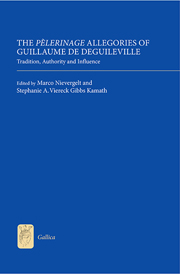Introduction
Published online by Cambridge University Press: 05 December 2013
Summary
The Cistercian monk Guillaume de Deguileville, also known as Guillaume de Digulleville and Guillermus de Deguilevilla, produced what could be termed both the best-known and the least known literary corpus of the fourteenth century: Deguileville's collection of compositions found a remarkable popularity in the centuries immediately following its production yet suffered almost equally striking critical neglect in modern scholarship before a rise in interest from the mid-twentieth century onwards. The corpus as it survives today consists of the allegorical French pilgrimage narratives PVH (existing in two versions, c. 1331 and c. 1355 respectively), PA (c. 1355) and PJC (c. 1358), as well as the shorter narrative Roman de la fleur de lys [Romance of the Lily] (c. 1338) and varied Latin pieces. All of Deguileville's narratives are composed for the most part in the octosyllabic couplets characteristic of late medieval French verse, yet each of the pilgrimage narratives also features accompanying or embedded French, Latin, or macaronic texts in a variety of forms, and Deguileville's period of composition interestingly coincides with the linguistic transition now described as the movement from ancien français to moyen français. Most of what we know regarding the dating of the corpus and the life of Deguileville depends upon the interpretation of passages from his allegories that appear to be autobiographical in nature. Although spellings of his name vary, the poet's name suggests an origin in the town now known as Digulleville, near Cherbourg in present day France.
- Type
- Chapter
- Information
- The Pèlerinage Allegories of Guillaume de DeguilevilleTradition, Authority and Influence, pp. 1 - 22Publisher: Boydell & BrewerPrint publication year: 2013



